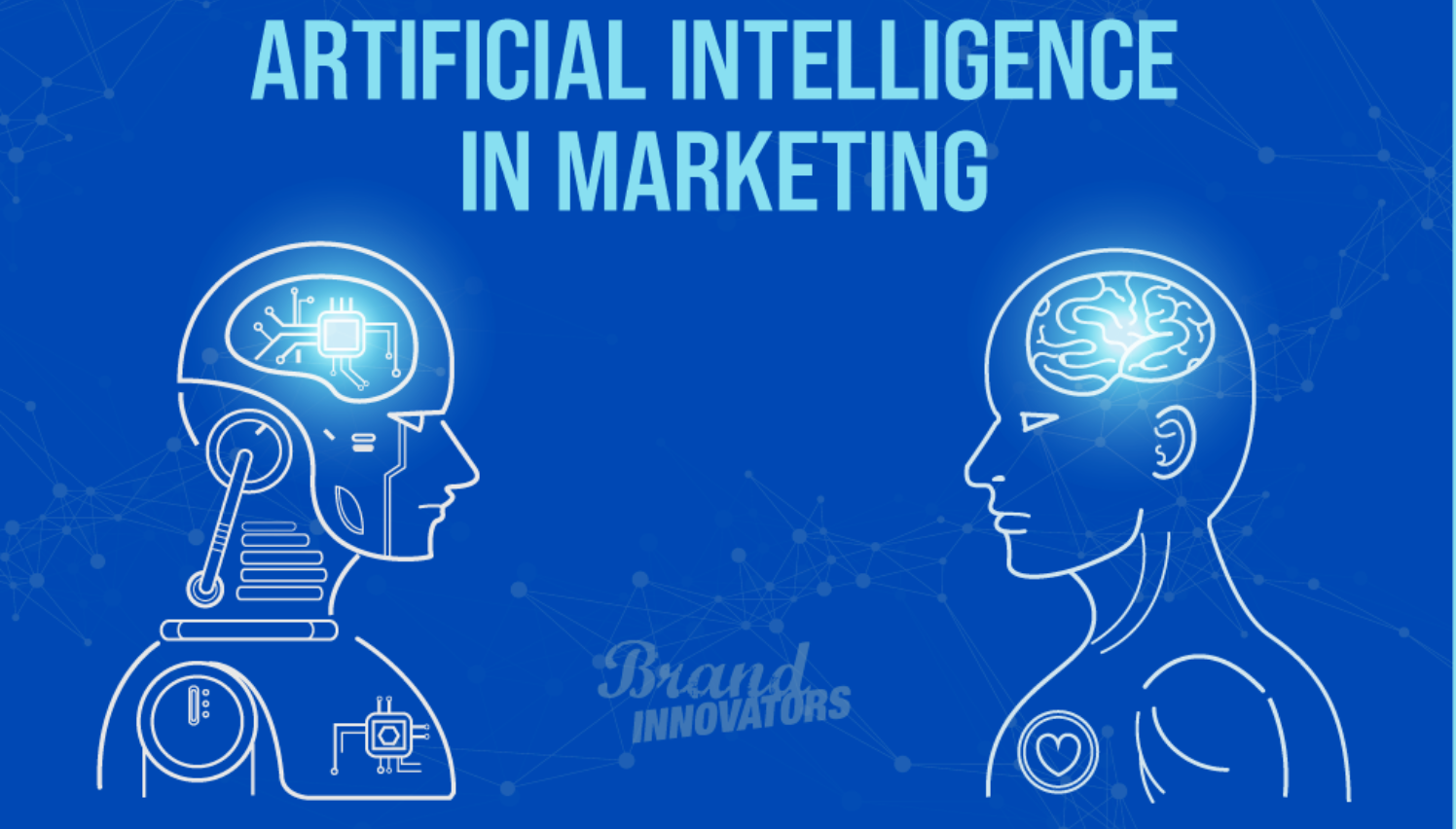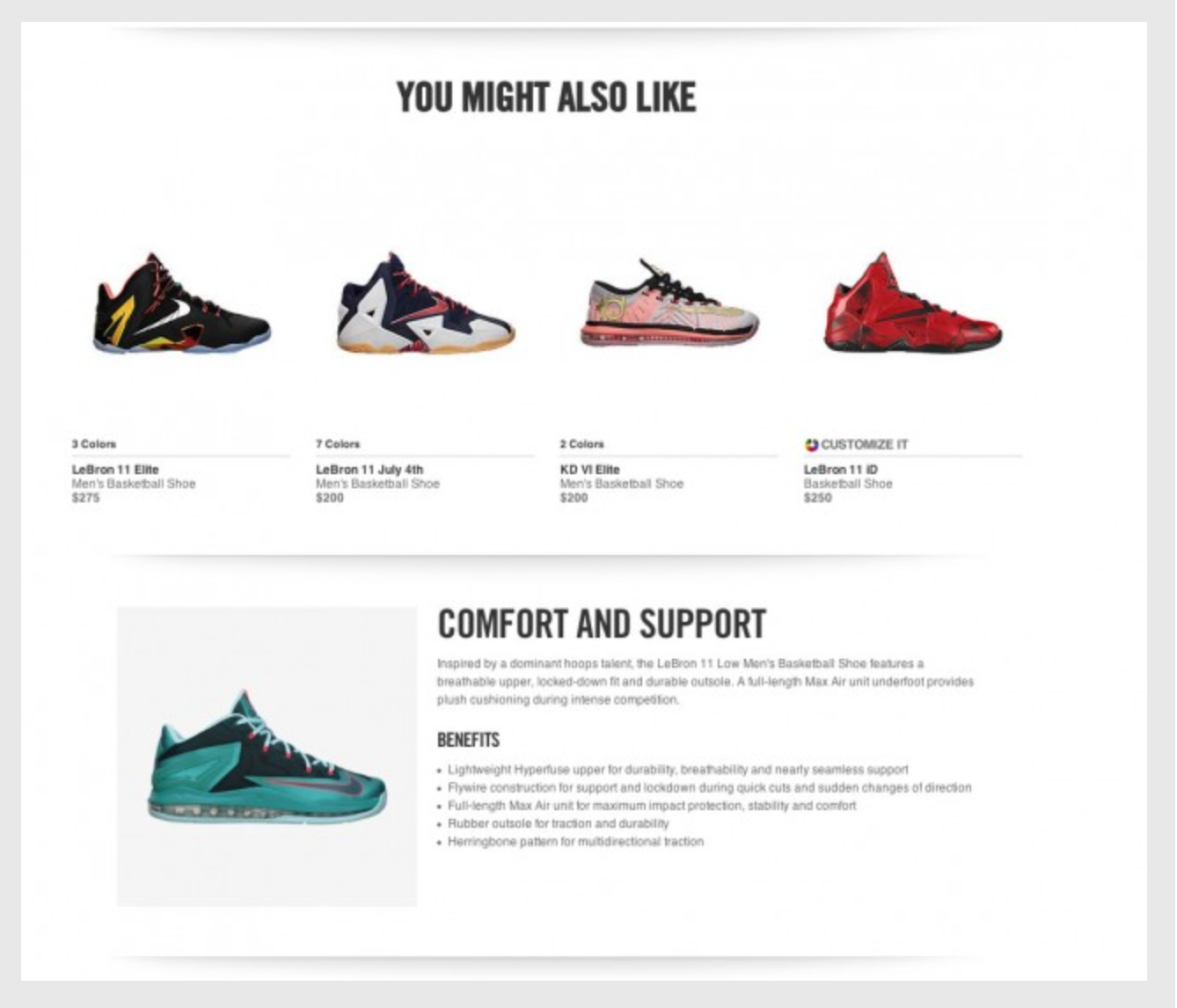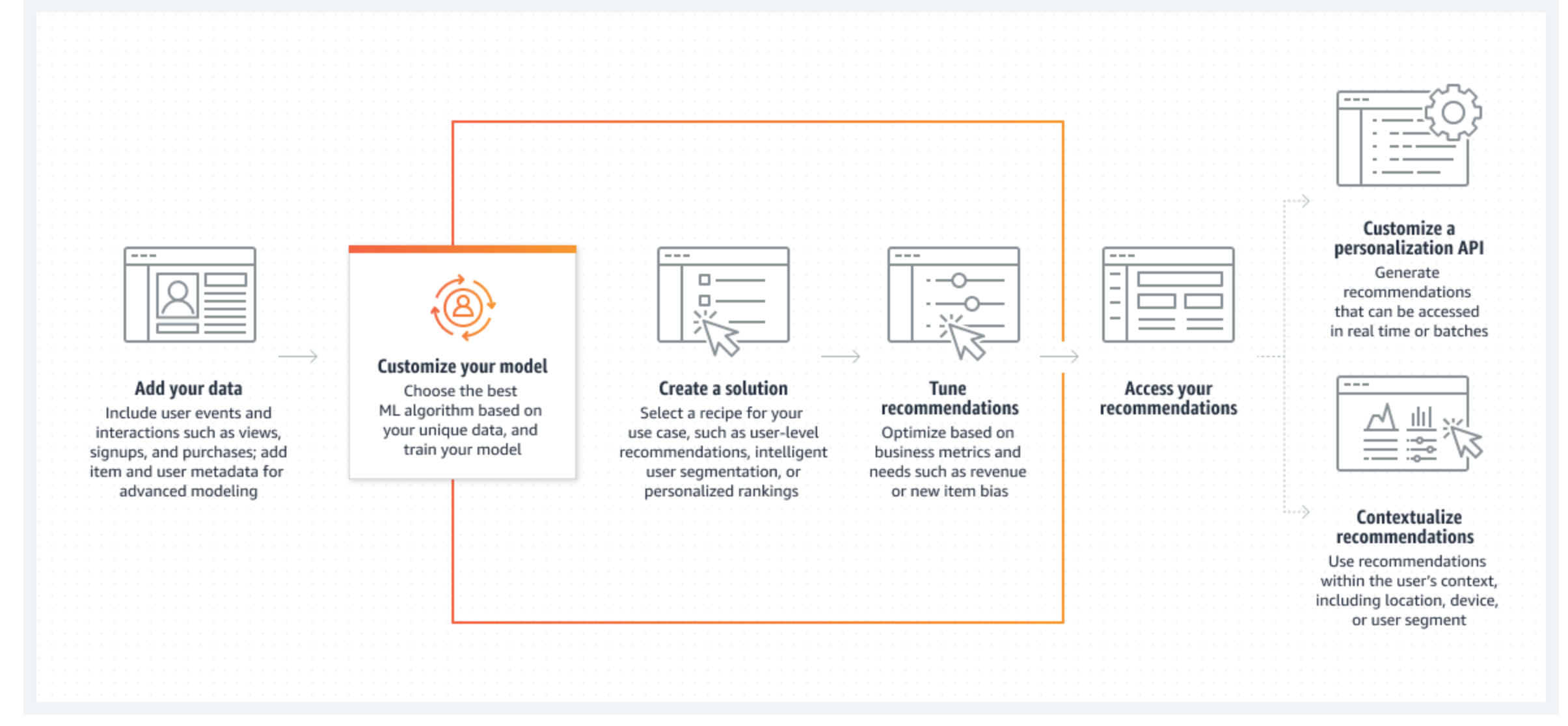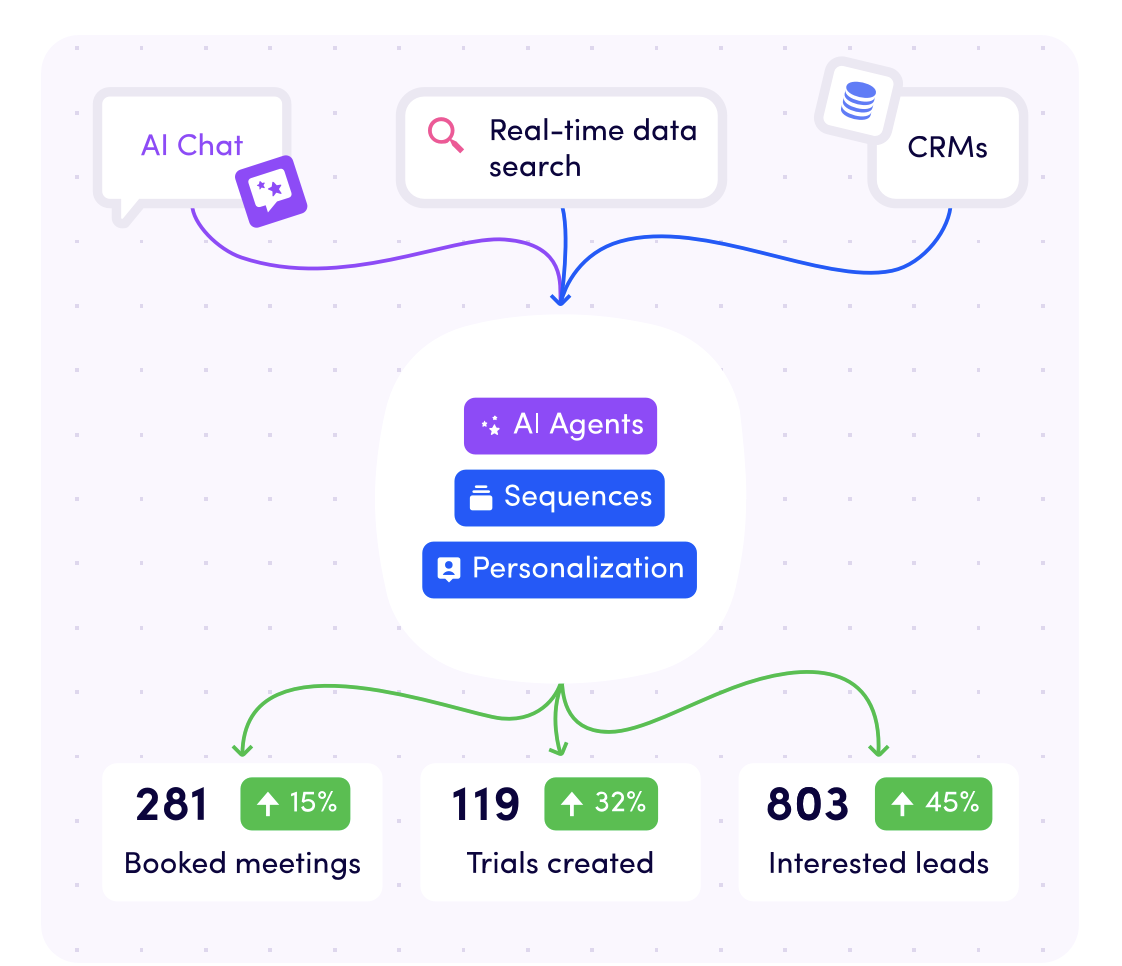What is AI marketing in 2024?

Entering the digital realm to help marketers optimise content, Artificial Intelligence in Marketing stands as a cutting-edge technological advancement demanding your attention! Explore the ins and outs of what it can do, where it's used, the different types available, and the latest trends driving the evolution of marketing.
As you wade through this tech-savvy journey, you'll discover a world where data becomes your trusty sidekick, helping you make informed decisions.
So, gear up, because the future of marketing is not just about keeping up; it's about leading the charge!
Everything you need to know about AI Marketing:
- What exactly is AI marketing?
-
When should AI marketing be incorporated into your approach?
-
Practical Applications of AI in Marketing: Real-World Examples
-
Unlocking AI in Marketing: A Step-by-Step Implementation Guide
What exactly is AI marketing?
Artificial intelligence marketing refers to a marketing approach that uses principles and frameworks from artificial intelligence.
This approach extends beyond automation; it accelerates content creation, analyses data for insights, and ensures rapid responses to support requests.
This strategic integration empowers the marketing team to navigate the digital age efficiently, marking a significant evolution in the marketing landscape.
AI marketing is reshaping how organizations connect with consumers, which is crucial in reducing time spent on repetitive tasks, as highlighted in the 2023 State of Marketing AI Report.
71%
of individuals anticipate real-time communication, contributing to the rising popularity of AI marketing solutions.
So, it has become a transformative force, enabling unprecedented efficiency and innovation.
(Image source: AI Marketing)
How does artificial intelligence play a part in marketing?
Imagine artificial intelligence (AI) not only as a technological marvel but as a warm and convincing collaborator in crafting digital content that truly resonates with customer profiles.
Contrary to common perceptions, a fusion of AI and human intuition surpasses the capabilities of human intuition alone.
A recent survey by Persado, involving 250 retail digital marketers, revealed that even seasoned professionals opted for the highest-performing digital marketing messaging only 30% of the time.
AI's role in marketing transcends content refinement; it evolves into a dynamic force learning customer satisfaction and preferences, adapting rapidly to behavioural shifts, and delivering spot-on engine recommendations.
Beyond this, it anticipates customer spending patterns, conducts insightful market research, and offers real-time assistance when live agents are unavailable.
The marriage of artificial intelligence and marketing becomes a logical alliance, leveraging the plethora of available data points, and boosting marketing efforts.
In our exploration, we dive into the essence of AI marketing, uncover the nuances of its four distinct types, and dissect how innovative companies harness AI to elevate their marketing strategies, inciting customer engagement.
When should AI marketing be incorporated into your approach?
Wondering when to use it? Here are some of the many ways in which you can use AI Marketing:
- Data Analytics
- Content Marketing Generation
- Media Buying
- Chatbots
- Automated Email for Digital Marketing Campaigns
- Forecasting Sales
- Improving Customer Service and Experience
Check out this article to learn how to apply AI in marketing in 2024!
Practical Applications of AI in Marketing: Real-World Examples
Various sectors, such as healthcare, retail, government, and financial services, use artificial intelligence tools in their marketing strategies to optimise marketing processes, elevate customer experiences, increase deep learning and improve the effectiveness of campaign performance and marketing initiatives.
The applications of AI in marketing encompass the following scenarios:
-
Programmatic advertising optimises ad space bids and delivers tailored content to target audiences at the most opportune moments.
-
Intelligent account-based marketing employs AI to extract insights from keyword searches, online data, and social profiles.
-
Analysis of search patterns helps marketers pinpoint critical areas for marketing focus.
-
AI bots or chatbots streamline customer interactions through direct-to-consumer engagement, driving higher conversion rates and enhancing efficiency for employees.
-
Predictive analytics reveals insights into outreach campaigns and facilitates real-time decision-making.
-
Intelligent advertising design evaluates and refines design elements to enhance engagement with the target audience.
-
Image recognition interprets visual information, evaluating brand awareness, market penetration, and associations with influencers.
-
Social listening, utilising NLP, identifies brand mentions and gauges brand sentiment.
-
Automated email content curation discovers and shares relevant and compelling content with your audience, helping with the writing of your email subject lines.
-
AI-driven dynamic pricing provides personalised e-commerce pricing by monitoring cookies, history, searches, and other online activities.
Unlocking AI in Marketing: A Step-by-Step Implementation Guide
This straightforward guide is your key to navigating the integration of AI into your marketing strategy.
Let's explore the practical steps together, demystifying the process without unnecessary complexity.
Ready to unlock the potential of AI in your marketing journey? Let's get started.
Have a look into this 5-step process to have effective marketing strategies:
Step 1: Establish goals: you must set clear and specific targets for your campaign.
Step 2: Ensure ample data quantity and sources: for the successful operation of marketing AI, it is essential to have a substantial amount of readily available data. This information trains an AI tool in customer preferences, economic factors, and external trends.
Step 3: Adhere to data privacy laws: To uphold consumer trust, adhere to privacy standards and integrate them into the programming of your AI.
Step 4: Test the quality of the data: maintaining high-quality data is another crucial aspect. Marketers need to work together with various departments and data management teams to formulate a plan for maintaining and storing data.
Step 5: Choose the solution that's right for you: Evaluate available options, considering factors such as scalability, compatibility with your existing systems, and the specific functionalities needed for your campaign. This step involves making an informed decision to deploy a solution that maximises the potential of your AI-driven marketing efforts.
To prepare your business for the future of AI, you can consider these strategies that are explained in detail here.
The most important AI trends in 2024
With existing and undoing advances in AI Tech, trends and concerns come into place.
Here are the most important and expected AI Trends in 2024:
1. Privacy and security worries are on the rise:
Despite AI's positive impact, trust issues remain. Consumers fear their data could be misused.
To address this, marketers must be transparent about data collection and use it for customer benefit.
Organisations also need to enhance cybersecurity as hackers are leveraging AI.
Businesses must take extra measures to safeguard customer data from AI-driven threats.
2. Voice-enabled AI is set to revolutionise marketing:
Even though it has been a hot topic for years, conversational AI is still underutilised in marketing.
But guess what?
This is about to change! Shortly, marketers will need to incorporate speech recognition technologies into their strategies.
Voice recognition tech was predicted to become a vital business channel in 2022.
3. AI will continuously improve at creating creative content:
The intelligence of AI in marketing is rapidly advancing, as you may know.
As more marketers embrace AI in their strategies, the technology is mastering various algorithms and enhancing its content creation skills in social media posts.
The exciting part?
The more data it gathers, the more remarkable its outputs become.
Brace yourself for some seriously impressive AI-generated content, spanning copy, images, videos, and essentially any medium you can think of.
Unveiling AI's Influence: Showcasing Marketing Examples
Online shopping has never been more efficient. At Nike, there is a feature to personalise shopping experiences:
The technology empowers Nike's website to suggest products tailored to individual customers, allowing users to search for items using conversational language or images without human interaction.
Nike extensively leverages AI to personalise the customer journey, providing significant value to their business.
(Image source: Nike)
How about personalised recommendations? Amazon features suggestions for products based on what other customers, who purchased the same item, also bought.
Amazon's personalised product recommendations enhance the shopping experience, addressing the 53% of shoppers who research before making a purchase.
Whether based on historical purchases or similar products at various price points, these recommendations aim to educate and facilitate purchase decisions.
Amazon's dynamic pricing strategy, adapting rapidly to market demand, positions the company as a market leader, staying ahead of competitors and offering customers attractive product prices before rivals can respond.
(Image source: Amazon)
How does an intelligent personal assistant sound to you? BMW has it!
Besides the technology customising the system and cabin experience for each driver, BMW's AI-powered sports cars feature an intelligent personal assistant.
This assistant, activated by voice, manages functions like Climate control, Lights, Media, and settings such as Caring car and Experience Modes.
Beyond these functions, it enables communication with the car similar to smartphones, offering voice-activated guidance for simplified destination input, alerts, and integration with other apps.
What are the types of AI marketing?
Simplifying this intricate domain, AI marketing primarily falls into three overarching categories:
Big Data and Predictive AI: This category revolves around the use of vast and precise datasets to analyse behavioural patterns.
By making predictions and deriving valuable customer insights, marketers can optimise their campaigns for superior results.
Leveraging first-party data, willingly shared by customers, adds an extra layer of depth to understanding audiences and informs more nuanced decision-making.
Generative AI: This focuses on content creation across various mediums, with AI-powered tools including text, images, and code.
This transformative capability allows marketers to swiftly and accurately produce fresh, engaging content for their campaigns.
A standout example is ChatGPT, renowned for its prowess in generating diverse and high-quality content.
Optimising Operations: The third category centres on using AI to streamline and automate marketing activities.
From automatically delivering targeted emails based on website behaviour to reducing manual tasks, this facet of AI marketing enhances operational efficiency and improves overall data quality.
Embracing automation ensures a seamless and responsive marketing workflow, enabling marketers to stay ahead in the dynamic landscape of the digital realm.
Navigating the Challenges: AI in Marketing
-
Training Time and Data Quality: The challenge lies in the time-consuming training of AI models and ensuring the quality of the data used for effective learning.
-
Privacy: Safeguarding customer privacy becomes a critical challenge as AI marketing involves handling vast amounts of personal data.
-
Getting Buy-In: Convincing stakeholders and obtaining organisational support present challenges in implementing AI marketing strategies.
-
Deployment Best Practices: Ensuring optimal deployment and adherence to best practices are essential challenges in effectively leveraging AI for marketing purposes.
-
Adapting to a Changing Marketing Landscape: Deep learning and machine learning, the challenge involves staying agile and responsive to the dynamic shifts in the marketing environment as influenced by evolving technologies and consumer behaviours.
Want to learn more about AI for business?
You’re in the right place! AI is a fascinating field and one that is building tremendous traction across the business landscape.
As technology advances, artificial intelligence applications for business are becoming more plausible in everyday practice.
AI is being used to save time and increase productivity outputs over many different roles and sectors.
It’s no longer a far cry into the future, it’s here, available, and ready to be implemented.
So how can you learn more about using AI in business?
As a leading educational course provider, we created the most effective AI for business courses you can find!
This course will help you and your team boost productivity with AI solutions and make data-driven decisions for the future.
6 Modules | 24 lessons | 24 videos | 6 tests | 6 exercises
- Module 1: AI and Machine Learning Fundamentals
- Module 2: AI business strategy
- Module 3: GenAI for text: ChatGPT and prompt engineering
- Module 4: GenAI for design: text prompts and visual communication
- Module 5: AI for productivity
- Module 6: AI-powered predictive insights
To wrap up, what is the future of AI in marketing?
Harnessing AI in marketing is not merely a trend to follow but a strategic move to lead.
It's not just about keeping pace but amplifying efficiency, fostering growth, and securing a competitive advantage.
The marketing terrain is transforming, and AI serves as the guiding force, not in some distant future but as a present-day reality for the marketing team.
The call to action? Embrace the change and do not be left behind!
This is just the surface of the AI marketing wave. Each technique holds the potential to be your secret ingredient for remarkable growth.
Given that, are you ready to explore an AI marketing tool and leave all your competitors behind?
FAQ
How is AI used in marketing?
AI in marketing simplifies customer experiences and streamlines tasks, automating elements like chatbot interactions and analysing data for informed decision-making. Rather than replacing traditional marketing activities, AI works to enhance efficiency and effectiveness.
Is artificial intelligence the future of marketing?
AI holds the potential to facilitate various marketing tasks, such as personalised content creation, customer journey optimisation, and audience segmentation, generating valuable insights. However, its inability to establish a genuine human connection with audiences suggests that AI cannot entirely replace the human touch in marketing.
Will AI impact marketing jobs?
AI tools serve as valuable additions to marketing technology, assisting with automation and data analysis. Despite these advancements, there's no need for job concerns as AI lacks emotional intelligence and true natural language processing. AI will not replace humans but we should learn how to work with AI. If you are interested in reading more about this, download our Skills of Tomorrow report here.
Categories
- Business & Innovation (83)
- Growth & Marketing (72)
- Artificial Intelligence (53)
- Data & Analytics (16)
- Case studies (10)
- Project Management (10)
Related articles
Latest articles
AI in Finance: Why You Need It Now
Imagine a world where loans are approved in seconds. Sounds...
ChatGPT Search Unveiled: Should You Make The Switch Now?
Picture this: You’re no longer just “searching” the web—you’re...
Shadow AI Explained: How to Harness Hidden AI Without the Risks
Picture this: your team is under pressure to deliver results—fast....
The 33 best AI tools for commercial teams
The tools are split into 2 categories The best AI tools for your...
















